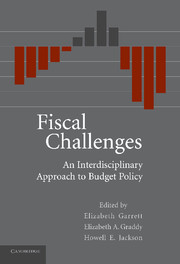Book contents
- Frontmatter
- Contents
- Preface
- Contributors
- PART ONE THE LAW AND POLITICS OF FISCAL POLICY
- PART TWO UNDERSTANDING FEDERAL DEFICITS AND PUBLIC DEBT
- PART THREE BUDGETING AND FISCAL CONSTRAINTS AT THE STATE LEVEL
- PART FOUR INTERGOVERNMENTAL ASPECTS OF BUDGET POLICY
- 11 Dysfunctional or Optimal Institutions? State Debt Limitations, the Structure of State and Local Governments, and the Finance of American Infrastructure
- 12 Federal–State Budgetary Interactions
- Part Four Bibliography
- PART FIVE JUDICIAL POWERS AND BUDGET POLICY
- Index
12 - Federal–State Budgetary Interactions
Published online by Cambridge University Press: 23 December 2009
- Frontmatter
- Contents
- Preface
- Contributors
- PART ONE THE LAW AND POLITICS OF FISCAL POLICY
- PART TWO UNDERSTANDING FEDERAL DEFICITS AND PUBLIC DEBT
- PART THREE BUDGETING AND FISCAL CONSTRAINTS AT THE STATE LEVEL
- PART FOUR INTERGOVERNMENTAL ASPECTS OF BUDGET POLICY
- 11 Dysfunctional or Optimal Institutions? State Debt Limitations, the Structure of State and Local Governments, and the Finance of American Infrastructure
- 12 Federal–State Budgetary Interactions
- Part Four Bibliography
- PART FIVE JUDICIAL POWERS AND BUDGET POLICY
- Index
Summary
INTRODUCTION
The foregoing chapters on federal fiscal policy never stray far from the fundamental goal of balance. Some may focus on near-term balance; others may be more concerned with long-term actuarial balance in major social insurance programs' financing mechanisms; still others may address the intergenerational equity of the unified federal budget. A simple-minded attempt to translate these concerns to the state level would suggest that states have no significant structural budgetary problems: All but one state is required to balance its budget annually, and all regularly do so. Sometimes balance comes easily; sometimes it comes amidst pitched political battles with temporary government shutdowns. In the end, however, all states have budgets that, at least to a first approximation, are balanced. The question of balance, per se, therefore is not particularly central to debates about state fiscal policy.
That does not mean, however, that state fiscal policy is fundamentally unproblematic. Indeed, by some measures the public may be even less satisfied with state fiscal policy than with federal. Budgetary problems probably end proportionately more political careers at the state level. A steady stream of ballot initiatives addresses both the grand structure of state budgets and removes particular decisions from annual budgetary debates.
This chapter explores the similarities and differences between federal and state fiscal policies. It examines the causes of popular dissatisfaction with states' fiscal performance, suggesting that serious problems exist, but in areas and at times that have heretofore escaped broad notice.
- Type
- Chapter
- Information
- Fiscal ChallengesAn Interdisciplinary Approach to Budget Policy, pp. 366 - 395Publisher: Cambridge University PressPrint publication year: 2008



